#native sioux
Explore tagged Tumblr posts
Text

Chief Sitting Bull. Hunkpapa Lakota ... Late 1800s ... Photo by F. A. Rinehart
30 notes
·
View notes
Text
"Cody Two Bears, a member of the Sioux tribe in North Dakota, founded Indigenized Energy, a native-led energy company with a unique mission — installing solar farms for tribal nations in the United States.
This initiative arises from the historical reliance of Native Americans on the U.S. government for power, a paradigm that is gradually shifting.
The spark for Two Bears' vision ignited during the Standing Rock protests in 2016, where he witnessed the arrest of a fellow protester during efforts to prevent the construction of the Dakota Access Pipeline on sacred tribal land.
Disturbed by the status quo, Two Bears decided to channel his activism into action and create tangible change.
His company, Indigenized Energy, addresses a critical issue faced by many reservations: poverty and lack of access to basic power.
Reservations are among the poorest communities in the country, and in some, like the Navajo Nation, many homes lack electricity.
Even in regions where the land has been exploited for coal and uranium, residents face obstacles to accessing power.
Renewable energy, specifically solar power, is a beacon of hope for tribes seeking to overcome these challenges.
Not only does it present an environmentally sustainable option, but it has become the most cost-effective form of energy globally, thanks in part to incentives like the Inflation Reduction Act of 2022.
Tribal nations can receive tax subsidies of up to 30% for solar and wind farms, along with grants for electrification, climate resiliency, and energy generation.
And Indigenized Energy is not focused solely on installing solar farms — it also emphasizes community empowerment through education and skill development.
In collaboration with organizations like Red Cloud Renewable, efforts are underway to train Indigenous tribal members for jobs in the renewable energy sector.
The program provides free training to individuals, with a focus on solar installation skills.
Graduates, ranging from late teens to late 50s, receive pre-apprenticeship certification, and the organization is planning to launch additional programs to support graduates with career services such as resume building and interview coaching...
The adoption of solar power by Native communities signifies progress toward sustainable development, cultural preservation, and economic self-determination, contributing to a more equitable and environmentally conscious future.
These initiatives are part of a broader movement toward "energy sovereignty," wherein tribes strive to have control over their own power sources.
This movement represents not only an economic opportunity and a source of jobs for these communities but also a means of reclaiming control over their land and resources, signifying a departure from historical exploitation and an embrace of sustainable practices deeply rooted in Indigenous cultures."
-via Good Good Good, December 10, 2023
#indigenous#native americans#first nations#indigenous rights#tribal sovereignty#solar energy#solar power#solar panels#renewable energy#green energy#sioux#sioux nation#sustainability#climate hope#electrification#united states#hope#good news
2K notes
·
View notes
Text
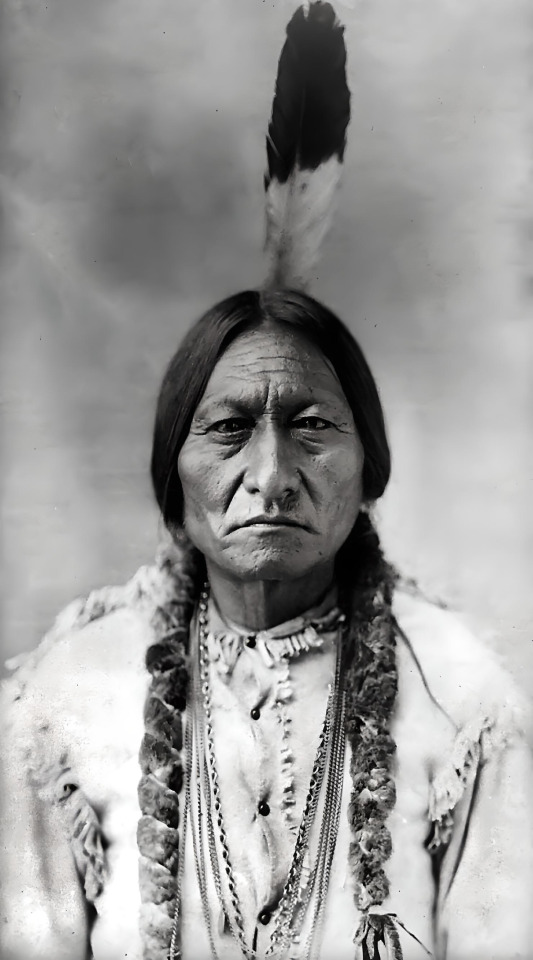
#beyond the adobe#western living#sitting bull#sioux indians#native americans#standing rock#custers last stand#wounded knee
204 notes
·
View notes
Text

Photographic half-length portrait of a Native American (Dakota) man named Sun Flower, taken by a photographer for Heyn Photo in 1899. Now in the Prints and Photographs Division, Library of Congress.
#photography#history#historic photography#portrait#photo portrait#Native American#American Indian#Dakota people#Dakota Sioux#19th century#19th century photography#black and white#b&w#b&w photography#photographic print#Library of Congress
585 notes
·
View notes
Text
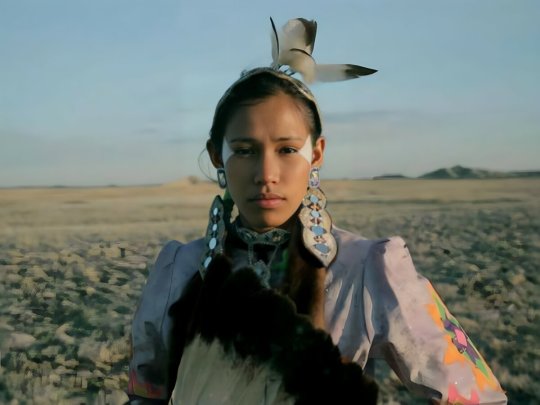
Songs My Brothers Taught Me | Chloe Zhao | 2015 | United States
#film#cinematography#film still#movie stills#film screenshots#movie screenshots#cinema still#cinema screenshots#cinema screencap#movie screencaps#film screencap#chloe zhao#indigenous#native america#american indigenous#native films#native american films#native american movies#lakota sioux#american films#lakota#chloezhao#native american cinema#cinema#movies#films#indigenous american#native american#south dakota#women filmmakers
56 notes
·
View notes
Text

Couple Dakota Oglala, Pine Ridge agency - Cross
81 notes
·
View notes
Text
Rosebud Yellow Robe

Rosebud Yellow Robe was born in 1907 in Rapid City, South Dakota. Yellow Robe was an early proponent of the study of Native American cultures. From 1930 to 1950, she served as director of Indian Village at Jones Beach State Park. There, she educated schoolchildren by performing ceremonial dances, teaching crafts, and telling stories. In 1969, Yellow Robe published her first book, Album of the American Indian, which depicted the daily lives of seven different Indian tribes before colonization. In 1979, she published her second book, Tonweya and the Eagles, a collection of Native American folktales for children.
Rosebud Yellow Robe died in 1992 at the age of 85.
Image
#native american#american indian#indigenous#indigenous women#native history#american history#history#lakota sioux
23 notes
·
View notes
Text
youtube
41 notes
·
View notes
Text

Heebe-Tee-Tse, Shoshone
Credit : Denver Public Library Special Collections
Creator : Rose & Hopkins.
Date : 1899
Half-length studio portrait of Heebe-Tee-Tse, Shoshone Native American man, He wears a headdress and holds a tomahawk decorated with bells and feathers. Indians of North America--Clothing and dress; Indians of North America--Portraits; Shoshoni Indians; Tomahawks; Heebe-Tee-Tse.
12 notes
·
View notes
Text


𝐋𝐨𝐮 𝐃𝐢𝐚𝐦𝐨𝐧𝐝 𝐏𝐡𝐢𝐥𝐥𝐢𝐩𝐬 𝐢𝐧 𝐒𝐢𝐨𝐮𝐱 𝐂𝐢𝐭𝐲 (𝟏𝟗𝟗𝟒)… 𝐈 𝐰𝐚𝐬 𝐡𝐞𝐫𝐞 𝐟𝐨𝐫 𝐭𝐡𝐞 𝐩𝐥𝐨𝐭 (𝐓𝐡𝐞 𝐩𝐥𝐨𝐭 👆🏼)
#lou diamond phillips#young lou diamond phillips#sioux city#1994#native american movie#actor#hollywood actor#90s films#90s#90s movies#own gifs#own edit#Jessie rainfeather
11 notes
·
View notes
Text
Native Tribe To Get Back Land 160 Years After Largest Mass Hanging In US History
Upper Sioux Agency state park in Minnesota, where bodies of those killed after US-Dakota war are buried, to be transferred
— Associated Press | Sunday 3 September, 2023

The Upper Sioux Agency State Park near Granite Falls, Minnesota. Photograph: Trisha Ahmed/AP
Golden prairies and winding rivers of a Minnesota state park also hold the secret burial sites of Dakota people who died as the United States failed to fulfill treaties with Native Americans more than a century ago. Now their descendants are getting the land back.
The state is taking the rare step of transferring the park with a fraught history back to a Dakota tribe, trying to make amends for events that led to a war and the largest mass hanging in US history.
“It’s a place of holocaust. Our people starved to death there,” said Kevin Jensvold, chairman of the Upper Sioux Community, a small tribe with about 550 members just outside the park.
The Upper Sioux Agency state park in south-western Minnesota spans a little more than 2 sq miles (about 5 sq km) and includes the ruins of a federal complex where officers withheld supplies from Dakota people, leading to starvation and deaths.
Decades of tension exploded into the US-Dakota war of 1862 between settler-colonists and a faction of Dakota people, according to the Minnesota Historical Society. After the US won the war, the government hanged more people than in any other execution in the nation. A memorial honors the 38 Dakota men killed in Mankato, 110 miles (177km) from the park.
Jensvold said he has spent 18 years asking the state to return the park to his tribe. He began when a tribal elder told him it was unjust Dakota people at the time needed to pay a state fee for each visit to the graves of their ancestors there.

Native American tribe in Maine buys back Island taken 160 years ago! The Passamaquoddy’s purchase of Pine Island for $355,000 is the latest in a series of successful ‘land back’ campaigns for indigenous people in the US. Pine Island. Photograph: Courtesy the writer, Alice Hutton. Friday 4 June, 2021
Lawmakers finally authorized the transfer this year when Democrats took control of the house, senate and governor’s office for the first time in nearly a decade, said State Senator Mary Kunesh, a Democrat and descendant of the Standing Rock Nation.
Tribes speaking out about injustices have helped more people understand how lands were taken and treaties were often not upheld, Kunesh said, adding that people seem more interested now in “doing the right thing and getting lands back to tribes”.
But the transfer also would mean fewer tourists and less money for the nearby town of Granite Falls, said Mayor Dave Smiglewski. He and other opponents say recreational land and historic sites should be publicly owned, not given to a few people, though lawmakers set aside funding for the state to buy land to replace losses in the transfer.
The park is dotted with hiking trails, campsites, picnic tables, fishing access, snowmobiling and horseback riding routes and tall grasses with wildflowers that dance in hot summer winds.
“People that want to make things right with history’s injustices are compelled often to support action like this without thinking about other ramifications,” Smiglewski said. “A number, if not a majority, of state parks have similar sacred meaning to Indigenous tribes. So where would it stop?”
In recent years, some tribes in the US, Canada and Australia have gotten their rights to ancestral lands restored with the growth of the Land Back movement, which seeks to return lands to Indigenous people.

‘It’s a powerful feeling’: the Indigenous American tribe helping to bring back buffalo 🦬! Matt Krupnick in Wolakota Buffalo Range, South Dakota. Sunday 20 February, 2022. The Wolakota Buffalo Range in South Dakota has swelled to 750 bison with a goal of reaching 1,200. Photograph: Matt Krupnick
A National Park has never been transferred from the US government to a tribal nation, but a handful are Co-managed with Tribes, including Grand Portage National Nonument in northern Minnesota, Canyon de Chelly National Monument in Arizona and Glacier Bay National Park in Alaska, Jenny Anzelmo-Sarles of the National Park Service said.
This will be the first time Minnesota transfers a state park to a Native American community, said Ann Pierce, director of Minnesota State Parks and trails at the natural resources department.
Minnesota’s transfer, expected to take years to finish, is tucked into several large bills covering several issues. The bills allocate more than $6m to facilitate the transfer by 2033. The money can be used to buy land with recreational opportunities and pay for appraisals, road and bridge demolition and other engineering.
Chris Swedzinski and Gary Dahms, the Republican lawmakers representing the portion of the state encompassing the park, declined through their aides to comment about their stances on the transfer.
— The Guardian USA
#Minnesota#U.S. 🇺🇸 News#World 🌎 News#Native Tribes#Land Buy Back#The Upper Sioux Agency State Park#Burial Sites of Dakota People#United States 🇺🇸 | Failed Treaties#Native Americans#Kevin Jensvold | Upper Sioux Community#US-Dakota War of 1862#Dakota Men Killed | Mankato#Minnesota Historical Society#State Senator | Mary Kunesh | Democrat | Descendant | Standing Rock Nation#Granite Falls#Mayor Dave Smiglewski#US 🇺🇸 | Canada 🍁 🇨🇦 | Australia 🇦🇺#Ancestral Lands Restored#Land Back Movements#Grand Portage National Nonument#Canyon de Chelly National Monument#Glacier Bay National Park#Ann Pierce | Minnesota State Parks#Chris Swedzinski | Gary Dahms | Republican Lawmakers
271 notes
·
View notes
Text
mreeddesigns on TikTok
9 notes
·
View notes
Text
One of the great military fiascos of American history, The Battle of the Little Bighorn, took place on this date in 1876. There were no photojournalists present, to be certain, but we do have pictographs by one of the Lakota participants in the battle, Red Horse. It’s difficult to really see very much, and well-nigh impossible for a non-expert to interpret more than a fraction of what is being depicted. But as the only visual record of the event by an eyewitness, these are of historical value, if nothing else.


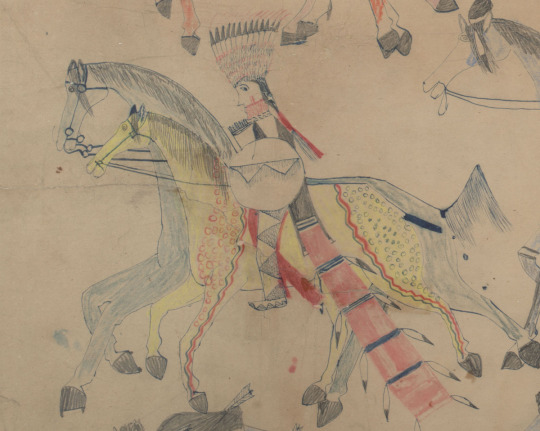

#19th century#art#pictographs#american history#native american#lakota sioux#general custer#little bighorn
6 notes
·
View notes
Text
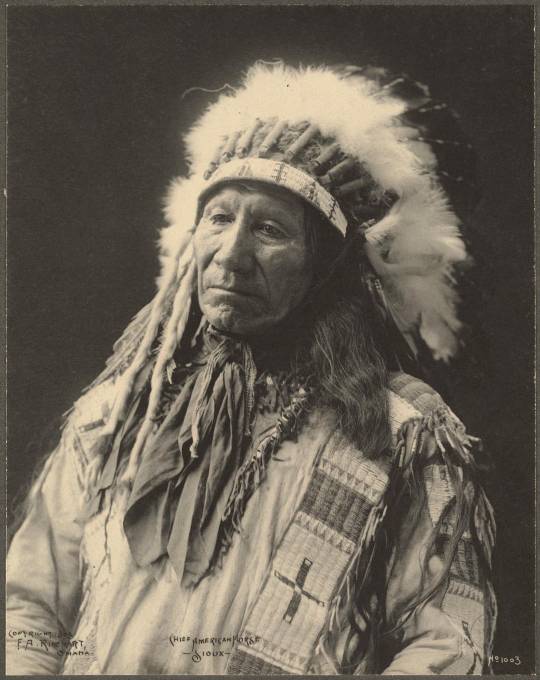
Portrait of Oglala Lakota Chief American Horse, 1898
Photographer: Frank Rinehart
#reddit#snapshothistory#anemic_twink#photography#photographer#american indian#native american#1890s#indigineous people#native people#oglala#1898#lakota#chief american horse#1800s#frank rinehart#b&w#oglala lakota#sioux#history#native american heritage month
35 notes
·
View notes
Text

Portrait (Front) of Ce-Tanze or Se-Tan-Si-Tan or Che-Tan-Zhi or Cha-Ta-He or Cha-Ta-Se (Yellow Hawk), Dakota Sans Arc, in Native Dress with Ornaments and Holding Pipe-tomahawk and Bag - Shindler - 1867
38 notes
·
View notes
Text
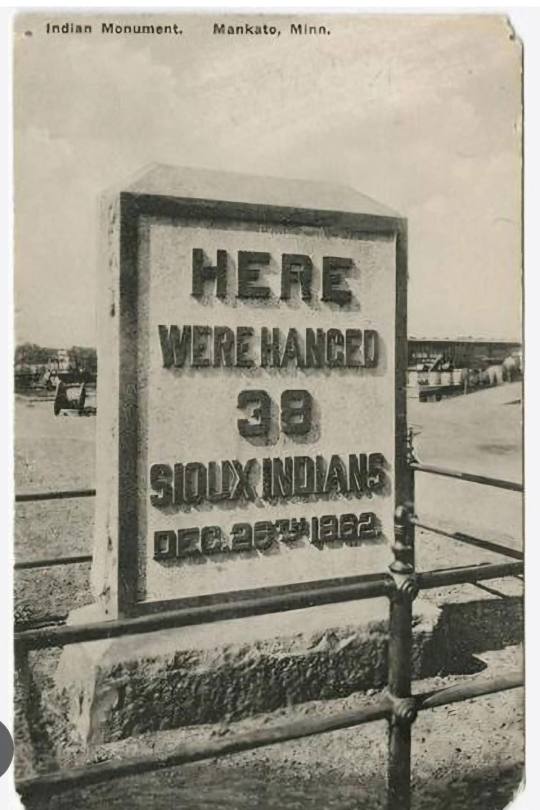
December 26th, 1862. Largest mass hanging in United States history happened to our Dakota people.
5 notes
·
View notes